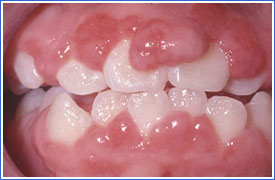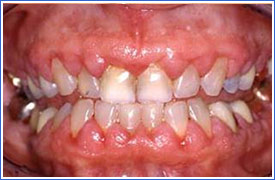Gingival Hyperplasia
Gingival hyperplasia can be associated with poor oral hygiene, underlying systemic disease, or as a medication side effect. Oral hygiene may be impaired by developmental disability or poor manual dexterity as a result of stroke, osteoarthritis of the hands, or Alzheimer's disease or other dementia.
Symptoms
- Gums or teeth have unsightly gingival enlargement.
- Teeth become hard to clean which puts patients at risk for periodontal disease.
- Periodontitis may occur particularly where there is concurrent gingival inflammation, untreated dental plaque, and poor oral hygiene.
Etiology
- Poor oral hygiene practices
- Drug induced (Phenytoin, Methotrexate, Cyclosporin, Calcium channel blockers)
- Underlying systemic disease (e.g. leukemia) and conditions (e.g. pregnancy)
Preventive Measures & Treatment
- Meticulous oral hygiene
- Regular professional cleanings
- May require gum resection surgery
- Alternative medications may need to be considered
Severe Gingival Hyperplasia

Severe Gingival Hyperplasia

References
Peker I, Alkurt MT, Usalan G. Clinical evaluation of medication on oral and dental Health. Int Dent Journal. 2008; 58: 218-222.
Kumar A, Kumar V, Singh J, et al. Drug Induced Gingival Hyperplasia: An Updated Review. Int J of Pharm & Toxicology Science. 2011; 1: 34-42.